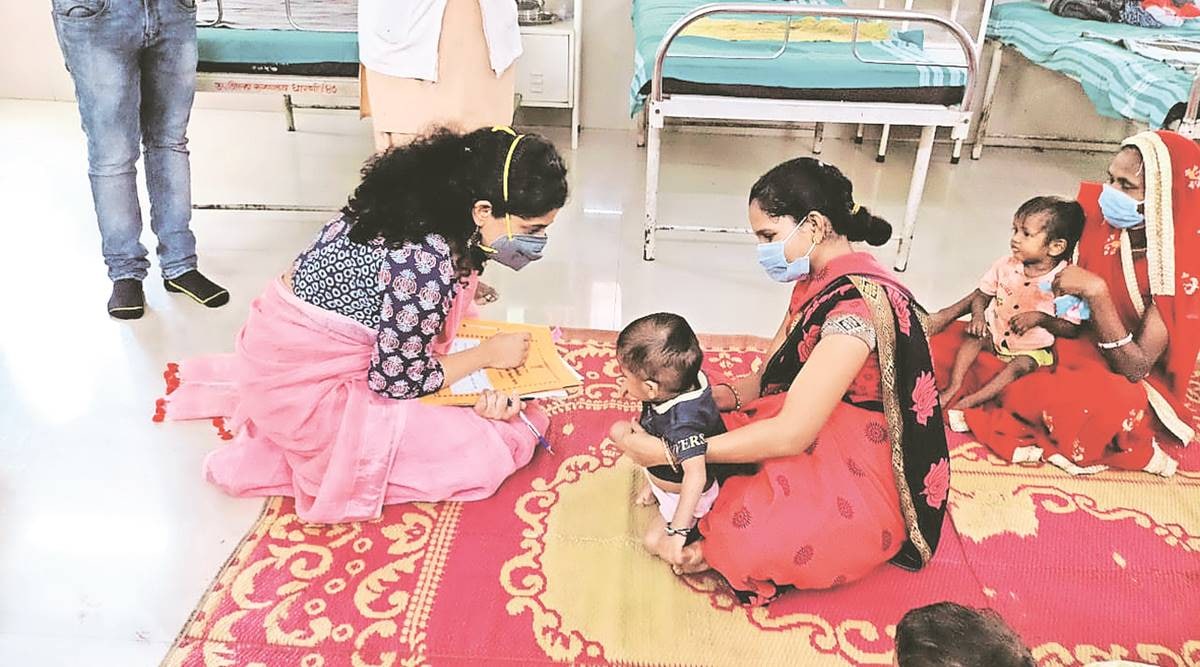July 17, 2021 2:07:50 am
 State has several schemes
to tackle malnutrition.
State has several schemes
to tackle malnutrition. MELGHAT, A remote and tribal area in Amravati district of Maharashtra, has seen many cases of malnutrition. When Dr Mittali Sethi, the then project officer (PO) of Integrated Tribal Development Projects (ITDP), Dharni, deep-dived into data, certain facts came to light. “Analysis of data showed that in March, for the past two years, Melghat has more malnourished children than all other regions of the district. The numbers went down post-June to again peak in March next year,” she said.
For children in tribal areas of Melghat, the state government has several schemes to tackle malnutrition. The children get eggs, take-home ration and other nutritious meals under these schemes.
Further analysis showed that this peak matched Holi season when the migrant families, who had left their villages, returned home. It also brought to light the fact that children, who were identified as malnourished and put on a remedial diet, ended up losing the benefit once they migrated.
To understand why so many children end up slipping the line, Dr Sethi and her team decided to study the problem in detail. Their survey revealed that after harvesting Kharif crops, many families migrated to find work in the brick kilns in Akot taluka of the neighbouring Akola district.
“We sent teams to talk to the brick kiln owners to get an idea about the number of children who migrated with their parents. Their answer was an eye-opener. The owners said they keep a count of the adults but there was no count of children,” she said. Thus, the children who were within the ambit of various welfare schemes dropped out of the same when their parents migrated, she added.
Inter- and intra-state migration, although a fact, is often not considered during policy planning. When families migrate, they take their children with them, but this creates a major problem for the children.
“When people travel, ideally the entitlements they get should also be portable… But at present, this does not happen. For example, the Child Development Project Officer of Akola expressed his helplessness in supplying anything special for the migrant children, the system just did not allow it. We realised that a policy-level intervention to track such children is necessary. Also, we need to ensure service delivery is assured to these children,” Sethi said.
Children of cane harvesters, who travel with their parents from Marathwada or north Maharashtra to harvest cane in the fields of western Maharashtra, also suffer the same fate.
On paper, such a scheme would require inter-department coordination and, in many cases, it would require the transfer of budget heads also. Thus, to study the problem and come up with a solution wherein every eligible child gets their entitlement, the state government formed a high-power committee in June.
Headed by Indra Mallo, the commissioner of Integrated Child Development Scheme (ICDS), the committee also comprises Dr Sethi along with members from Rajamata Jijau Mother-Child Health and Nutrition Mission, IIT Powai, UNICEF, International Institute for Population Science, and various representatives of ICDS and women and child welfare department. This would be the first time such a move has been made in the state.
Speaking to The Indian Express, Mallo said the committee wants to work on a mechanism to ensure portability of entitlements.
Families who are entitled to free grains from Public Distribution System often fail to draw the same when they travel. “The ration card is left in the village and those who are left behind draw the ration. There are problems of language, of approach. Our work is to address this holistically,” she said.
The Dharni experiment, which will be the pilot basis for the mechanism, will use software to track the malnourished children. Dedicated software has been developed, where the details of the child-like height, weight etc would be logged in at the origin. This would automatically be displayed under the login of the destination CDPO.
- The Indian Express website has been rated GREEN for its credibility and trustworthiness by Newsguard, a global service that rates news sources for their journalistic standards.

